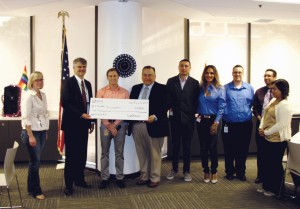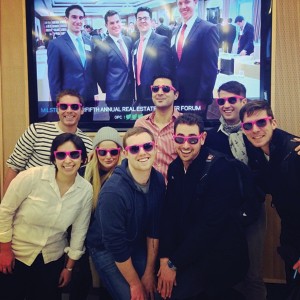
Southern California Edison president Ron Litzinger, second from left, joined Ross Boomer, third from left, president of SCE’s Lighthouse Employee Resource Group, and others in presenting a $2,000 check to Bienestar, a local nonprofit dedicated to the well-being of the LGBT community.
By Genny Hom-Franzen
Joanne Sprague envisions a culture where everyone — not just the LGBT community — stands up for LGBT inclusion.She believes that when people speak up for what’s right — no matter which people they are — assumptions and stereotypes start to change, and culture around the world begins to improve. Sprague is the CEO of Friendfactor, a nonprofit organization whose mission is to motivate straight people to become visible and active allies in their workplaces and campus communities.According to Friendfactor, among the 96 percent of Americans who identify as straight, 77 percent say they support LGBT equality. Only 14 percent, however, say they have actually done something about it.Stepping up In order to encourage straight people to stand up for their LGBT friends’ rights, Friendfactor has organized two national ally challenges. The first is a competition among schools that offer masters’ degrees in business administration, and the second is a contest among corporations to improve the LGBT-friendliness of their campuses or corporate cultures, respectively. Enticing schools and companies to participate in the challenge required an understanding of the two cultures.
Sprague said that business school students are more excited about trying something new and creating change,while corporations are typically more risk-averse. “I was happy that eight Fortune 500 companies stepped up to take actionable steps to measure and improve their culture around LGBT issues,”she said.
Eight corporations competed in the first Workplace Ally Challenge from January to June of 2014, including Pacific Gas & Electric Co., Pfizer Inc., Southern California Edison, Bank of America Corp. and ConAgra Foods Inc. The companies were judged on their efforts to build the largest and most effective LGBT ally initiatives in a six-month period. They were evaluated on how many events they organized, number of participants and an inclusion score, which compared the companies’ baseline levels of LGBT awareness and inclusiveness with those at the end of the six months, as measured by a 20-question survey.
One of the participating companies,Southern California Edison, is pleased with its involvement in Friendfactor’s corporate challenge. “Growing our ally base at Edison has become a key strategy for Lighthouse [SCE LGBT employee resource group], as we work to create a more inclusive environment for LGBT employees. Not only has Friendfactor been instrumental in providing us resources and guidance for meeting this goal, but the Ally Challenge itself has given Lighthouse a wonderful opportunity to learn from the other participating companies and share our own successes,” said Ross Boomer, president of Lighthouse.
In the second annual MBA Ally Challenge,a dozen business schools engaged some 4,300 students in more than 100 ally-focused activities throughout the school year. They improved the LGBT-friendliness of campus culture so much that nearly 50 percent more LGBT students felt comfortable being out to everyone on campus by the end of the school year. The Columbia Business School at Columbia University took top honors in this year’s challenge, with the Kellogg School of Management at Northwestern University taking second place and the Stephen M. Ross School of Business at the University of Michigan taking third. Humble beginnings Sprague came up with the idea for Friendfactor as a graduate student at The Fuqua School of Business at Duke University. A straight woman, she
heard about an incident at a diversity workshop from a friend who was in the process of coming out. During the meeting, another student made a statement that sexuality does not have a place in the workplace. What surprised — and motivated — Sprague was that not one person in the room of hundreds of students felt empowered or stood up to say anything in response. “That was my aha moment,” she said. “If straight people don’t have the language or courage to speak up for issues they care about, that silence creates a tacitly unwelcome and unsafe environment for LGBT people.
“Workplaces have been focused on increasing diversity for a long time, and they’ve done a pretty good job at it,” Sprague added. “But, we’ve not done as well with inclusion, and the key to that is educating and engaging majority, as well as minority, groups. The real shift in workplace equality will be in moving from diversity to inclusion.” Winners all Sprague is encouraged by the positive response to Friendfactor’s efforts thus far and said that planning for the 2015 challenges is already underway. Twenty-three business schools — almost twice as many schools as this year — are already on board to compete in the third annual MBA Ally Challenge, which begins in September. The Workplace Ally Challenge has been so successful that corporations will now have an entire year to build their LGBT-friendly corporate culture rather than just six months. The winners of this year’s challenge will be honored at Friendfactor’s First Annual Ally Challenge Awards Dinner on July 26 at the Hyatt Regency Hotel in San Francisco. “We want to raise awareness and enable everyone to take the next step in becoming champions of inclusion,” Sprague said. “We welcome corporations and universities to step up to the plate and join us.”





Leave A Comment